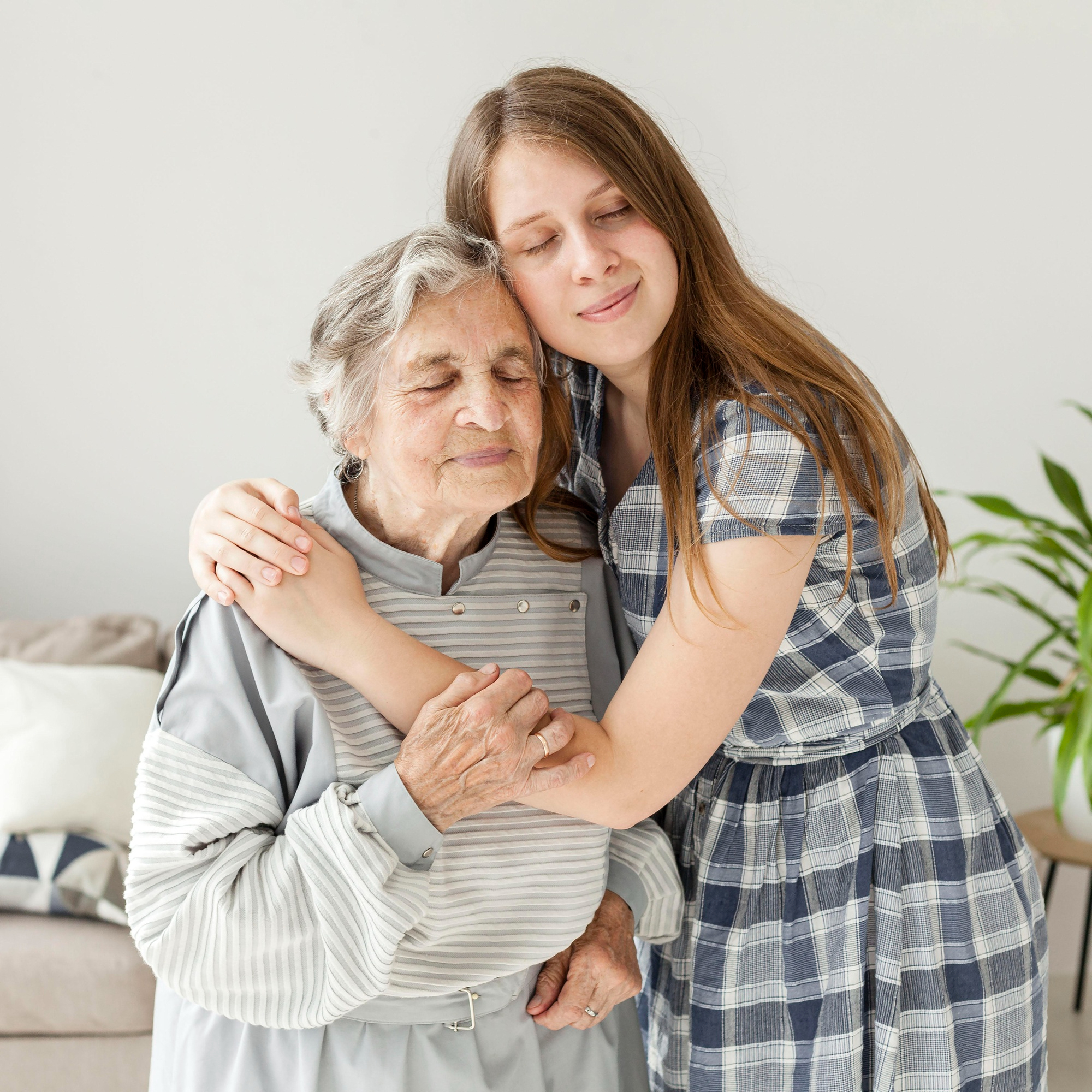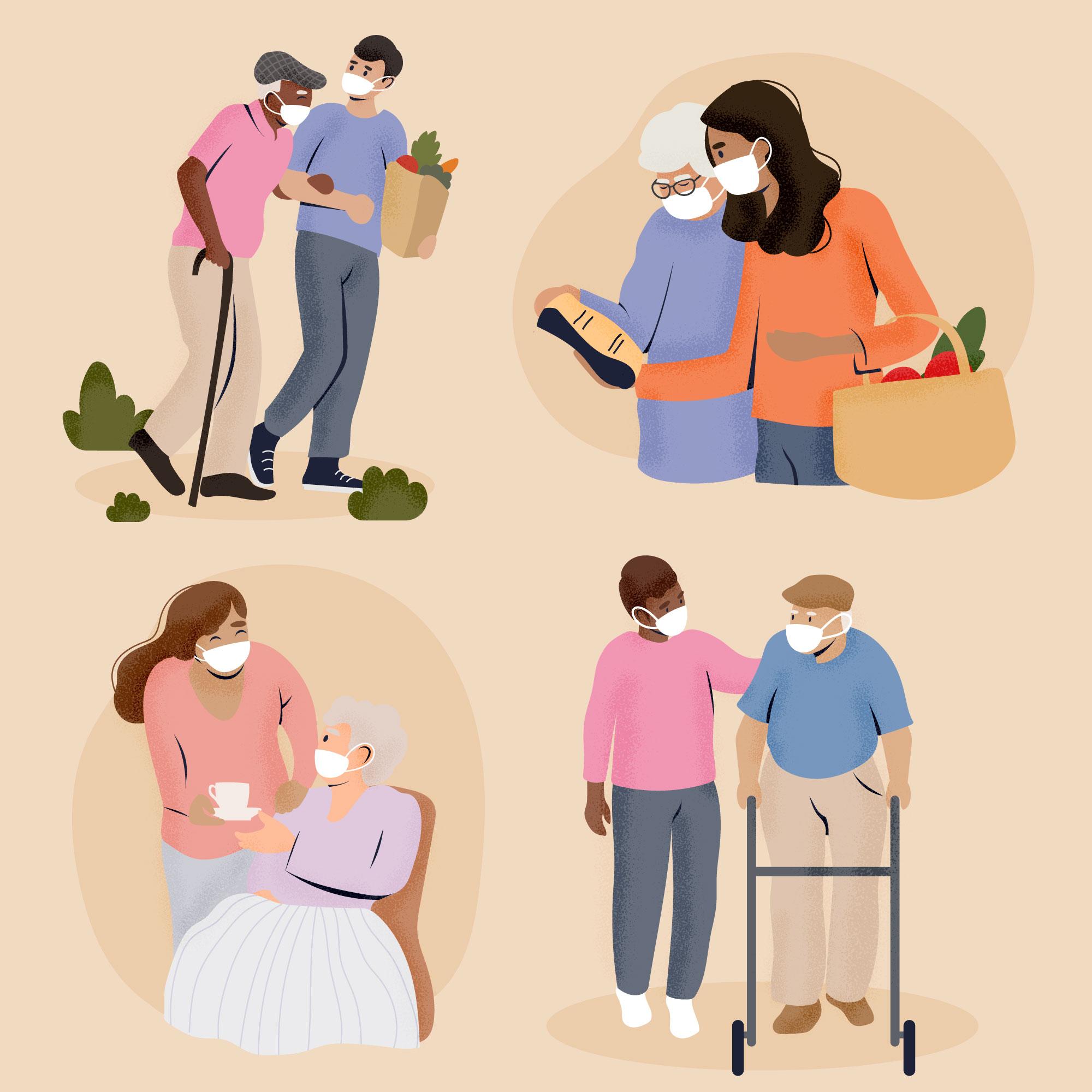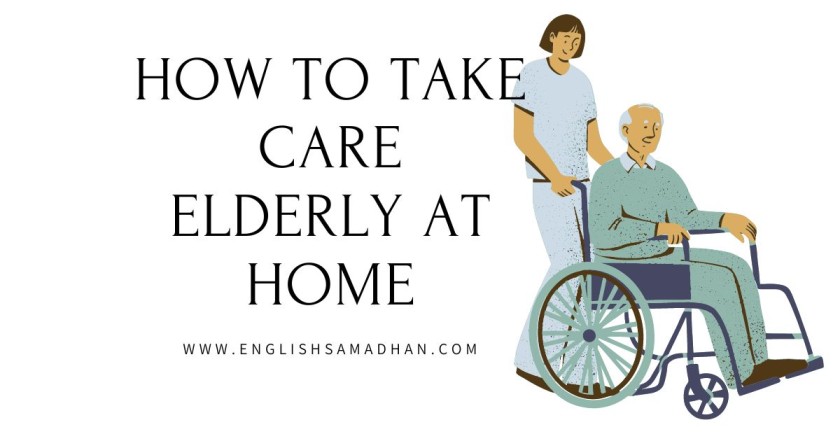![]()
Introduction to Caring for the Elderly: Leverage of Age and Experience
Let’s try to understand first the meaning of Elderly People. Elderly people are the people who are in their sixties and seventies and sometimes even more and are leading their lives to cope with time-generated issues.

Elderly people, in simple terms, are those individuals who have lived longer and have a valuable experiences throughout their lives. They are virtuous souls who have journeyed through many years, facing various ups and downs of life, experiencing several hardships, and are part of countless joys. Elderly people hold a treasure trove of stories, knowledge, and wisdom earned through their lifetime. They’re the ones who guide us with their stories and teachings which offer a unique way to shape our lives in a better way. They’re the dynamic personalities who deserve our love, respect, utmost care, and admiration. Let’s try to understand how to take care elderly at home through the following key points.
Table of Contents
Importance of Elderly Care
Caring for the elderly is incredibly important because it’s all about showing love and respect to those who’ve left footprints on the sands of time. They’ve lived a lot and learned many things, and their experiences are more valuable.
Taking care of elderly people is a great service to those who sacrificed their lives to nurture us. They bring so much richness to our lives with their stories, wisdom, and experiences.
Taking care of older people isn’t just a task. it’s a way to connect with them, share happy moments, and make them feel valued. It’s also about being grateful for all they’ve done for us. It’s a chance to honour their legacy and celebrate their lives while creating a nurturing environment filled with love, dignity, and respect.
The utmost experience of numerous years is transferred to the next generation in a few months. In this way, a lot of time can be saved and we can be far ahead of the person not having any previous experience taken from their ancestors. At this moment we come to understand what to do and what not to do at a certain period.
Understand the Significance of How To Take Care Elderly At Home
Understanding how to care for the elderly is like opening a door to their world, a world where love, patience, and kindness hold great significance. It’s about truly seeing and appreciating the needs and emotions of our elders. When we talk about caring for the elderly, we’re focusing on both their physical and emotional needs.

Physical Support
This is the first and basic part of starting care for elderly people. At this point, we have to give physical support to them. Providing physical support to our elders is an act of genuine care and love that goes beyond mere assistance. Here are some heartfelt ways to lend a helping hand:
- Assist with Daily Tasks: Helping with everyday activities like getting dressed, taking a bath, or having a meal isn’t just about getting things done. It’s about showing respect for their independence and dignity while being there for them in their time of need.
- Ensure Safety and Comfort: Making their surroundings safe and comfortable is crucial. Simple adjustments like installing handrails or removing trip hazards can make a huge difference, ensuring they feel secure and at ease in their own space.
- Support Mobility: Encouraging safe movement is essential. Whether it’s providing a steadying arm or arranging mobility aids, enabling them to move about comfortably maintains their freedom and confidence.
- Manage Medications: Keeping track of their medications and ensuring they take them as prescribed is a vital form of care. It’s about safeguarding their health and well-being, showing them that their health matters.
- Regular Health Check-ups: Arranging and accompanying them to medical appointments demonstrates our commitment to their well-being. Regular check-ups help in early detection of health issues, ensuring they receive timely and appropriate care.
- Adapt to Their Pace: Patience is key. It’s important to move at their pace, offering support without rushing or making them feel pressured. This shows that we respect their needs and value their comfort.
Providing physical support to our elders is not just about doing tasks; it’s about showing love, respect, and care in every action, ensuring they feel valued and cherished.
Emotional Support
Emotionally, caring for the elderly is about being a friend, a listener, and a source of comfort. It’s about understanding that sometimes they might feel lonely or worried, and being there for them, sharing stories, or simply being a companion can make a huge difference in their lives. Here are some nurturing ways to provide emotional support:
- Be a Companion: Spending quality time with them, sharing stories, and simply being present can alleviate feelings of loneliness and isolation.
- Listen and Validate: Be an attentive listener. Validating their emotions helps them feel understood and valued.
- Show Empathy: Understand that they might face challenges or worries unique to their age. Being empathetic and showing that you care about their concerns goes a long way in comforting them.
- Create Meaningful Connections: Encourage social interactions with friends, family, or community groups. Building connections and nurturing friendships enriches their life and brings them joy.
- Offer Encouragement: Remind them of their strengths and accomplishments. Encouraging words can boost their morale and confidence, making them feel appreciated and capable.
- Engage in Shared Activities: Participating in activities they enjoy, whether it’s gardening, playing games, or crafting, fosters a sense of joy and purpose, enhancing their emotional well-being.
- Express Love and Affection: Simple gestures like hugs, holding hands, or sharing heartfelt compliments convey love and warmth, reassuring them of your care and affection.
Providing emotional support to our elders is like wrapping them in a blanket of love and understanding. It’s about being there for them, acknowledging their feelings, and creating an environment filled with love, compassion, and companionship.
It’s like putting ourselves in their shoes, understanding their feelings and needs, and providing the support and care they deserve. Understanding elderly care is an emotional journey that involves empathy, compassion, and the willingness to make a positive difference in their lives.

Maintaining Health and Well-being
Ensuring the health and well-being of our beloved elders is a profound act of love and care. Here are some heartfelt ways to maintain their health and happiness:
- Nourishing Meals: Prepare nutritious meals that suit their dietary needs. It’s a way of showing love through food, ensuring they stay healthy and energized.
- Encourage Physical Activity: Tailor exercises to their abilities. Whether it’s a leisurely stroll, gentle yoga, or seated exercises, staying active supports their physical health and boosts their mood.
- Regular Health Check-ups: Schedule and accompany them to medical appointments. Keeping a check on their health ensures early detection and prompt treatment of any health concerns.
- Promote Mental Stimulation: Engage in activities that stimulate their minds. Brain teasers, puzzles, or learning new skills help maintain cognitive function and mental sharpness.
- Support Hobbies and Interests: Encourage their passions and interests. Engaging in hobbies they love brings them joy and a sense of purpose, nurturing their well-being.
- Create a Calm Environment: A peaceful and comforting environment is vital for their mental and emotional health. Ensure their living space is safe, and comfortable, and promotes relaxation.
- Stay Hydrated: Remind them to drink water regularly. Hydration is essential for overall health and helps prevent various health issues.
Maintaining the health and well-being of our elders is an emotional commitment, a way of expressing our gratitude for their presence in our lives. It’s about cherishing their well-being, ensuring they feel cared for, cherished, and valued every step of the way.
Seeking Professional Help:
Don’t hesitate to seek advice or assistance from professionals, be it healthcare providers, counselors, or support groups. It’s a proactive step to ensure comprehensive care for your loved ones.
Navigating challenging situations with the elderly requires a heart full of empathy and a willingness to adapt to their changing needs. It’s about providing unwavering support, being their pillar of strength, and ensuring their comfort and well-being throughout life’s complex journey.
Some Important Tips to Care for Elderly People
Home is the best place for caring
In old age generally, old persons of the family are sent to the old age home or some other isolated place which is not a solution for them rather they should be given a place not only in the home but also in the heart. In this way, they will get emotional support and value from the family. This will help them to stay healthy and fit.
Patient-Centered Caring
Old age comes with ailment and at this time, we should be very careful. Patients must be given proper and individual care by giving wholesome effort from the family.
Social Participation
They must be involved in some social activity to engage in their daily activity. Such as morning walks, being social in the nearby field with the same age group of people, doing some exercise together, laughing in a group, visiting the shrine places, and having some fun related activities, etc.
Keep Connected with New Technology and Gadgets
Technology and other health-related gadgets can be used to monitor their health from time to time.
- Devices that enhance well-being, like smartwatches with health-tracking features.
- Tools to support health, such as blood pressure monitors and glucose meters.
- Technologies that promote safety, such as fall detection alarms and GPS-enabled devices.
- Health-related gadgets like sleep trackers to improve quality sleep and overall health.
If needed, Appoint a caretaker
In case of emergency, a specialized caretaker must be appointed to understand and monitor to cope with the prevailing situation. The caretaker can be appointed from the medical field.
Cognitive challenges
- Mind-stimulating activities that keep our seniors engaged and vibrant.
- Brain-teasing puzzles and games to ignite the spirit of curiosity.
- Challenges that empower the elderly to retain mental agility and sharpness.
- Cognitive exercises should be practiced to improve memory and mental health.
Anti-skating floor
All-around care for elderly people is a little bit tricky and challenging. They get feeble because of aging as a result there is a need for an anti-skating floor from the drawing room to the kitchen and from the bathroom to the toilet. So to avoid this situation, keep your house fit with an anti-skating floor.
Fixing water temperature in the bathroom and toilet
Winter is a crucial season for old people so special attention should be given to the water temperature in the bathroom and toilet to avoid cough, cold, and other winter-related ailments.
Availability of proper lighting in the night
Availability of proper lighting in the night is very important. Approaching paths, corridors, toilets, bathrooms, etc must be equipped with proper light to avoid any mishappening with them.

Diet Plan
Taking care of our elders is so important, especially when it comes to their diet. Here’s a gentle and nourishing diet plan that could be beneficial for older people:
Breakfast:
- Fruit Salad: A colourful mix of seasonal fruits like papaya, banana, apple, and melons, provides a refreshing burst of vitamins.
- Nuts and Seeds: A handful of almonds, walnuts, and pumpkin seeds is a must for a healthy dose of essential fats and nutrients. Seasonal fruits must be provided as per the health condition of the patient. Always be in touch with a medical practitioner for suggestions.
- Poha: A light and easy breakfast made from flattened rice, cooked with onions, peas, and mild spices
- Idli or Dosa: These soft, fermented rice cakes or thin crepes made from lentils are not just tasty but also gentle on the stomach.
- Upma: A comforting dish made from roasted semolina, cooked with veggies like peas, carrots, and garnished with nuts.
- Oatmeal: A warm bowl of oatmeal with chopped fruits like bananas or berries for extra nutrition. The weather must be taken into consideration while providing any food.
- Low-fat Yogurt: A serving of yogurt for probiotics and calcium.
- Whole Grain Toast: A slice of whole grain bread/ chapati with a thin peanut butter or jam spread can be given.
Mid-Morning Snack:
- Fruit: An apple, pear, or a handful of grapes for a refreshing snack. Mid-morning Snack is essential for older people.
Lunch:
- Roti with Dal: Soft Indian Roti paired with a protein-rich lentil soup (Dal) is simple, wholesome, and incredibly nutritious.
- Vegetable Pulao: Fragrant rice cooked with assorted vegetables and mild spices, provides a balanced mix of carbs and vitamins.
- Curry with Rice: A flavourful curry made with vegetables or lentils, paired with steamed rice, ensures a good mix of protein and carbohydrates.
- Salad: A light salad with leafy greens, tomatoes, cucumbers, and simple olive oil can be added.
- Whole Grain: A few whole-grain cooked food items should be served to keep digestion fit.
Afternoon Snack:
- Nuts: A small handful of almonds, walnuts, or cashews for a healthy dose of good fats is required.
Dinner:
- Baked Fish: A serving of baked fish for omega-3 fatty acids.
- Steamed Vegetables: Steamed broccoli, carrots, and cauliflower for vitamins and minerals.
- Brown Rice: A small portion of brown rice for fibre and energy.
Evening Snack:
- Herbal Tea: A cup of soothing herbal tea or a glass of warm milk along with biscuits should be served.
Important Notes:
- Hydration: Encourage drinking plenty of water throughout the day.
- Portion Control: Keep portion sizes moderate to avoid digestive discomfort.
- Variety: Try to include a variety of foods to ensure a wide range of nutrients.
Remember, this is just a sample plan. It’s essential to consider individual dietary needs, preferences, and any medical conditions while planning meals for older adults. Consulting a healthcare professional or a nutritionist for a personalized diet plan is always a great idea!
Avoid Leaving Them in Isolation
It’s incredibly vital to ensure our elderly loved ones aren’t left feeling isolated. Loneliness can weigh heavy on their hearts and minds. Here are some ways to help them feel connected:
Regular Visits:
- Quality Time: Spend time with them regularly, even if it’s just for a cup of tea and a chat.
- Family Gatherings: Organise family get-togethers or outings to include them in family activities.
Social Activities:
- Community Events: Encourage participation in local community events or clubs tailored for seniors.
- Classes or Workshops: Look for classes or workshops that align with their interests, such as art, gardening, or music.
Technological Help:
- Technology Support: Teach them how to use simple communication tools like video calls or social media to stay in touch with friends and family.
- Online Groups: Help them find online groups or forums where they can engage with others who share their hobbies or experiences.
Volunteer Opportunities:
- Volunteering: Explore volunteer opportunities within the community that match their skills and interests.
- Charity Work: Engaging in charity work can give them a sense of purpose and connection.
Encourage Support Networks:
- Support Groups: Suggest joining support groups for seniors facing similar challenges or health conditions.
- Neighbourly Connections: Help foster connections with neighbours for occasional visits or chats.
Let’s make sure they know they’re cherished and valued, and that they’re an integral part of our lives. Little gestures of love and inclusion can truly brighten their days.
Conclusion
Caring for our elderly is all about love. It’s about being there for the people who’ve been there for us through thick and thin. It’s like wrapping them in a warm hug of support and understanding. From helping with everyday things like getting dressed to sharing stories and laughter, these little things show how much we care. It’s about treating them with respect and kindness, making sure they feel safe and cherished. As we journey through life with our elders, it’s not just about what we do—it’s about the love and warmth we bring to their lives. It’s a beautiful way to show our gratitude for all the wisdom and love they’ve given us over the years.
In the end, caring for our elders is like a love song that never fades. It’s about treasuring each moment and making their days brighter with our care and affection.
Thanks
Study more topics like: Value of Games and Sports and How To Deal With Exam Stress .
